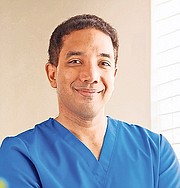By Dr Greggory Pinto
CRYOTHERAPY is also referred to as cryoablation or cryosurgery. It uses freezing gas to destroy prostate cancer cells, while leaving the prostate gland intact. The term cryotherapy is misleading as it is not a form of surgery. Cryotherapy was US Food and Drug Administration approved for prostate cancer treatment in the year 2000. It has been used in the past 20 years as an effective, minimally invasive management option for prostate cancer.
How does cryotherapy destroy prostate cancer?
Living tissue and cells of the body and prostate cannot tolerate extremely cold temperatures. Nitrogen or argon gas infused into the prostate gland rapidly extracts heat from the prostate gland. Ice crystals are formed as the heat is drawn out of the prostate gland, which causes rupture of the prostate cancer cells and cell death. Following the death of the prostate cancer cells, white blood cells clean up the dead cells and the body’s immune system attacks and destroys any remaining prostate cancer cells.
There are two types of cryotherapy: Whole prostate cryotherapy which treats the whole prostate gland, this includes the prostate cancer cells and the healthy prostate tissue. Focal cryotherapy only treats the prostate tissue that involves the prostate cancer, thus less healthy prostate tissue is frozen when compared to whole prostate cryotherapy.
Cryotherapy is an excellent treatment for men with localised prostate cancer, cases where the prostate cancer has only extended out of one side of the prostate gland or in the case of a prostate cancer recurrence after radiation therapy.
Men with very large prostate glands are not very good candidates for cryotherapy, but these patients may have their prostate glands reduced in size by hormonal therapy and then receive cryotherapy.
The occurrence of stress urinary incontinence with cryotherapy is generally much less than with other prostate cancer treatments such as radiation therapy or surgical removal of the prostate.
The cryotherapy prostate cancer treatment is minimally invasive and incision free. It is performed as an outpatient procedure or sometimes involves an overnight hospital stay.
A patient found to be a suitable candidate for cryotherapy prostate cancer treatment will receive general or spinal anaesthesia. The urologist will use image guidance to place six to eight tiny needles through the skin in the perineum and into the prostate gland.
Argon gas cools the needles within the prostate, which freezes the prostate tissue and kills the prostate cancer cells.
Cryotherapy is less invasive than even the da Vinci robot assisted or laparoscopic prostate cancer removal surgery, so there is a shorter hospital stay, quicker recovery, it is less painful and there is less possible blood loss.
Cryotherapy, like all prostate cancer management options, can have possible side effects such as impaired erectile function, bladder and bowel dysfunction, blood in the urine and acutely painful urination. Focal cryotherapy generally has less side effects than whole prostate gland cryotherapy.
The key to prostate cancer cure is always early detection. Ensure early detection by getting a prostate specific antigen (PSA) blood test annually starting at the age of 40.
Cryotherapy is one of many prostate cancer treatment options, including cancer removal surgery, radiation therapy, brachytherapy, high intensity focused ultrasound (HIFU), hormonal therapy and active surveillance.
One in six men will be diagnosed with prostate cancer in their lifetime, with men of African ancestry often having a more aggressive form of prostate cancer that occurs earlier in life than their other racial counterparts.
Seek comprehensive, confidential and compassionate care for prostate cancer treatment and surveillance.
• Dr Greggory Pinto is a board certified Bahamian urologist and laparoscopic surgeon. He has trained in Germany, South Africa and France, and is a member of the European Association of Urology. He can be contacted at OakTree Medical Center, #2 Fifth Terrace & Mount Royal Avenue. Telephone: (242) 322-1145 (6) (7); e-mail: welcome@ urologycarebahamas.com, or visit the website:www. urologycarebahamas.com.





Comments
Use the comment form below to begin a discussion about this content.
Sign in to comment
OpenID